It was not my intention to undertake a large thinking exercise about the Ukrainian conflict this week, but it seemed necessary to do so to assemble my thoughts.
The exercise began as a 'brain dump' onto a mind map, which grew somewhat, to the extent that I think it is appropriate to begin sharing this exercise, although work on the ideas is not yet complete.
I stress, this exercise has been written for my own benefit. It may well inform other videos and blogs. It was all about assembling my thoughts without seeking to be comprehensive or referenced. I may have missed things which appear evident to me. If I have, I apologise. Please understand, this is an example of a thinking process, not a finished product as such.
It is also intensely bullet point orientated, as mind mapping encourages.
I am sharing this thinking via screen shots of the MindMaps. To read them, work left to right, going from the topic to the highest of the topics that flow from it. When you have read all the topic's branches, move down to the next topic and repeat the process.
If you need to see a bigger version of a map, click on it and then click again, and it should go full screen.
Alternatively, and probably more easily, hold the Command or Control buttons on your computer and then hit the + button to enlarge your screen - which works well for me. I apologise for having no solution on a phone, but this will work on an iPad.
First, the scene is set:
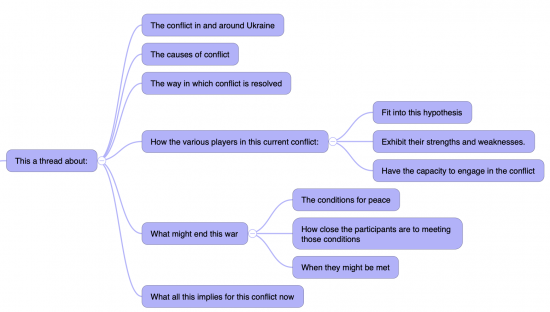
This sequence is critical to understanding my whole approach to what i think war is about:
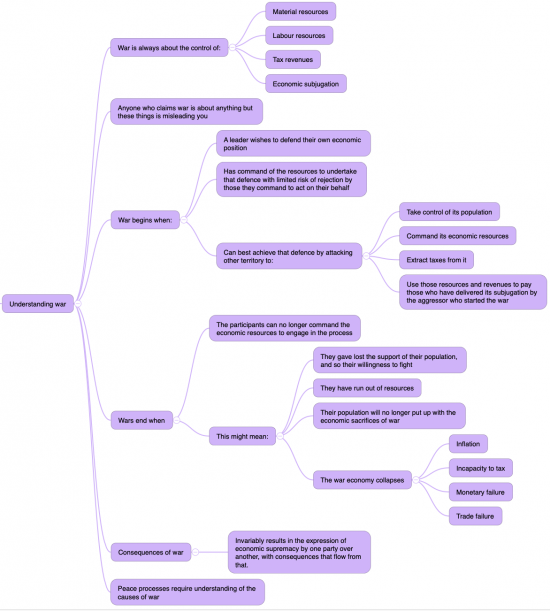
Next, these are the themes of the thread, only a few of which are dealt with in this post. The rest will follow, not necessarily today:
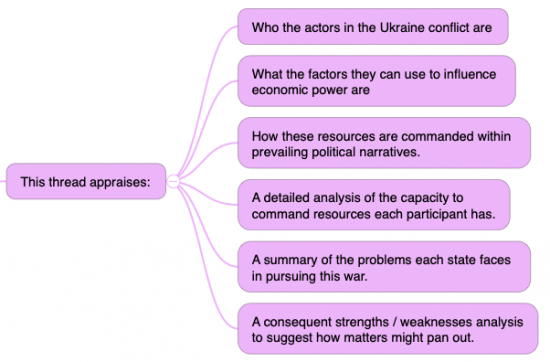
These are the countries and alliances I appraise in detail in a post that will follow:
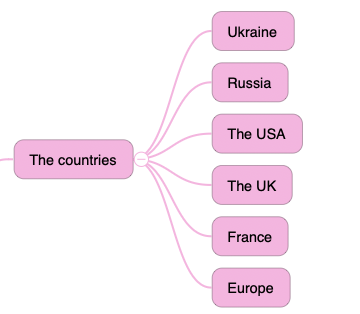
These are the parties that have significant power to exercise within these jurisdictions, in my opinion. Note, I treat economic powers as having soft power:
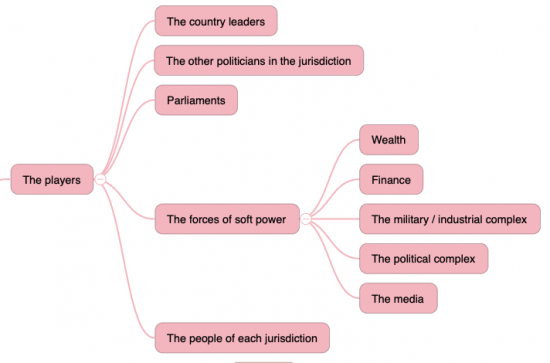 And these are the political environments that I think exist in which to analyse what is happening:
And these are the political environments that I think exist in which to analyse what is happening:
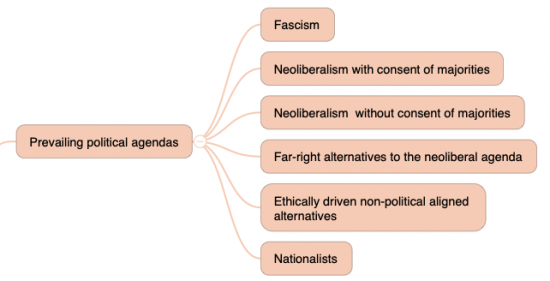
This is all scene setting stuff, but is enough to consider for now.
Comments are welcome. I suspect I will be working on the more detailed analyses later today.
And if there are typos, c'est la vie.
Thanks for reading this post.
You can share this post on social media of your choice by clicking these icons:
There are links to this blog's glossary in the above post that explain technical terms used in it. Follow them for more explanations.
You can subscribe to this blog's daily email here.
And if you would like to support this blog you can, here:


 Buy me a coffee!
Buy me a coffee!

Very very good. History validates some of the points (willingness of the population – Germany Sept 1918) .
The point about population & resource – again, the Ukrainians I speak to are concerned that if Russia takes over Ukraine – it will access not just resource (breadbasket & minerals) but people (tech world leaders in drones) – Russian population is collapsing, Urkaine would be a nice addition – ditto the Baltics. This is far more than just Putin staying in power, this is strategic.
Thanks
You get my thesis
I suggest there can be at least two other reasons for war: national pride/hubris, and domestic political gains. Napoleon, for example, was expert at using foreign wars to bolster flagging domestic support for his regime. It could be argued that China’s obsession with Taiwan has similar reasons.
These fit my hypothesis
You are fast becoming a powerhouse in warfare and international relations. Is there no end to your talents?
I was a professor of international polirtical economy
Why are you surprised that I might have thought about it?
How far back are you proposing to go in your analysis of the causes of conflict and the involvement of the parties you mention. Coverage of this conflict in most media only seems interested in events following Russia’s (unjustified) invasion. I don’t think that approach helps us move towards ending the conflict as a fair and lasting resolution requires an understanding of both sides’ experience and motivation.
My analysis is about now – that’s the whole point of it
Wars are fought now
“Wars are fought now”.
But wars only end with the total defeat of one party or a treaty based, amongst other things, on a mutual understanding of what caused the war.
Wrong.
Wars end when the economic capacity to continue of one party ends. That’s it.
Peace is a complicated business.
Stopping the violence/attacks/killing is only stage 1.
Shalom/Salaam/Mir/Peace with justice takes a lot longer, sometimes generations.
You know this already.
At the moment in Northern Ireland they have stopped the armed conflict (almost completely).
That has given them space to build a multi-generational peace, and that process still has a long way to go, but it has also come a long way, which is not always appreciated until we start to listen to younger people who do not have personal memories of the violence because they have grown up in a different type of society.
Bombs and bullets irreversibly kill people and those people are an irrecoverable loss – they never experience the peace – there is no future for them, under ANY sort of government, it is too late for them (in material terms).
Imperfect ceasefires have lots of flaws, but they do save lives because they stop the violence. Now. Then the peace-building process starts.
So trying to stop a war with an imperfect ceasefire is worth it, especially to those who don’t get killed.
Take Gaza – do they have peace or justice ? No of course not – but hundreds of Palestinians are alive today who would be dead, without the very imperfect and fragile ceasefire. Instead the West Bank is experiencing violence, and people are dying there.
Stopping the violence is about saving precious human lives. Peacemaking is about establishing long-term justice.
There are those who are working us towards a state of continual conflict – just as George Orwell predicted. They don’t care about the issues or who the enemies are – they just want the violence because it facilitates their kind of dominance, it increases their authority, their power, their wealth. They hate peace, they find it threatening. it involves listening, compromising, sacrifice, justice, recompense, even changing your mind.
What are the really frightening (to warmongers) subversive contributions WE can make ?
Love your enemies – what does that mean in practice? How do we DO it? To quote Corporal Jones, “they don’t like it up ’em” – and they really don’t. there are those who profit from persuading us to HATE our enemies, and they will do anything to dehumanise the enemy and mock the peacemakers. Love is an act of subversive resistance.
Blessed are the peacemakers (for they will be called the sons of God) – a bit worrying if you think you are ALREADY a son of God, but are pursuing a path of relentless violence as well as demonising the peacemakers – and I can think of plenty who fit that description, including plenty in my religious “tribe”.
I like your brain dump!
I hope that it gets read by people who can influence thinking and events.
Out there are “men and women of peace” scattered in surprising numbers in the corridors of power- may they be encouraged, emboldened and empowered.
KUTGW!
A thought: Misinformation and disinformation are a stock-in-trade for all participants, whether they are currently active or not.
I suspect that we would all do well to treat information with a growing sense of skepticism and anyone who now wants to take a healthy interest, perhaps need to keep notes on items they feel are important; for example, being able to later know for certain what was said/done, when and where could be important in developing a more accurate understanding.
I suggest we are already in this ‘world’. It will be interesting to read the more developed ideas and conclusions you reach.
I agree. Info (mis/dis) is a way of forming views and manipulating opinion. I offer this as an example:
Musk posted: “As distasteful as it is, Zelensky should be offered some kind of amnesty in a neutral country in exchange for a peaceful transition back to democracy in Ukraine.”
“back to democracy” – as defined by Putin or Musk? “peaceful transition” – will that include “can people fly out of tall buildings” experiments for those that don’t conform. I have a very very bad feeling about how things will develop.
That is worrying…
@Rich – You are right – during an earlier digital privacy campaign I learned quite quickly that what was online one day might not be online for long. That a comment I wrote to a forum might be taken down a day or so later. That a video referenced in a Wikipedia article might no longer be available. That a website with a rich archive of material might disappear because of a takedown request or a threatened libel action – or just the bullying behaviour of an internet giant or a criminal sending you keylogging malware in a targeted personal attack.
You quickly develop the habit of archiving stuff – of taking copies of forum or blog posts, of downloading your own Twitter archive, of downloading and archiving videos and articles, not just bookmarking them. (and storing them offline, not in some oligarch controlled cloud drive). Offline storage is cheaper than its ever been – it isn’t that difficult to run a NAS drive at home using a large capacity SSD. If I hadn’t done that, much of the material we gathered about mainstream ISPs and some very unpleasant and criminal internet startups would have been lost.
Our rights to digital privacy were seriously eroded long ago, so you have to take your own precautions especially now we are outside of the scope of the EU privacy directives (although they aren’t what they were).
I would suggest that things are far worse now and the time to take precautions is BEFORE you become a target of malicious action.
I find it useful that this website is archived by the British Libraty and, of course, Wayback Machine.
Excellent and thank you. I’m particularly interested in the sequence. Primarily so one could possibly anticipate or understand where opportunities may lie as to how war may be avoided
My collective is meeting in Brussels on Friday. Commission and Parliament. Subjects to be discussed (comments have already been made) output will probably be turned into a paper (current collective thought – no reform EU will cease to exist).
2025 marks the end of the post WW2 order ……….(counter point: 1971 end of Bretton Woods).
World Bank and the IMF will be extinct by the end of this year. Ditto the WTO. …………(add G7 and G20 with a big question mark )
The EU needs to reform / change to meet the triple challenges of a UST (US Trump), Ruzzia and China.
All the institutionals assumptions on which the EU was founded (WB, IMF, respect for rules) have gone.
The rule of law is still core for the EU & needs to be enforced/respected to the Nth degree.
The 1945 reality is/was that the USA was never really Europe’s friend this should have been recognised far earlier. ………(observation: Marshall plan as early as 1947 was predominantly about re-arming Europe, this is one of the best kept secrets of the EU history and myths)
All EU-US institutions should be closed & contact with the US reduced to the bare minimum. (counterpoint: No, because the U.S. is much more than just the federal government, we should actually intensify exchanges at all other levels )
Noted
It’s a pity that the residents of the occupied territories don’t get a look in on your mind map. I refer to the mainly ethnic Russian peoples of Crimea, the LPR, the DPR, the rest of the Donbass that Putin says he wants to capture and the pieces of Zaporizhya and Kherson oblasts under occupation or liberation depending how you see it.
That you’re not on the side of the little guy is apparent so just the big players make your mind map.
It reminds me of the people in this picture
https://www.france24.com/en/20191209-ukraine-peace-talks-paris-putin-zelensky-macron-merkel-elysee
There’s no-one there who is actually from the territories they are arguing over.
It seems you miss the basic point that the argument is over Ukraine.
What gives you the right to question its integrity?
Why are you ignoring the evidence that none of these areas have shown support for leaving Ukraine and joining Russia?
And you have clearly not understood my argument, at all.
You are also posting in a name I cannot verify to be yours. This is your last post unless you can prove your entitlement to that name. Mail me please.
“There’s no-one there who is actually from the territories they are arguing over. ”
When that picture was taken Putler only occupied a small bit of Ukraine (Donbass). Also Zelenski got elected by 65% of the pop – & by a large number of people in e.g. Zap’ oh & Zelenski is a Russian speaker. From your previous posts you mentioned discrimination against Russian speakers – I guess him being elected Ukrainian president is an example of that?
Tell me – how is the weather in St Petersburg theses days?
Yobanyi Pyzdets
All I see in Ukraine is check mate.
The game is either over, or it is time for a new game – and it had better be a good one.
If the U.S. was anywhere near being ‘grown up’, it would have reduced its support to Ukraine incrementally, enabling the EU to tool up and respond in an organised way to support Ukraine. But no, that is not going to happen. The orange dude is Putin’s best friend. The rug has been pulled.
The EU is now being subjected to a ‘shock doctrine’ similar to the one visited upon the USSR in the 1990’s. Can’t you see?
We’ve spent a lot of time talking about Trump, what he has done and said, and yes, it has had an negative impact for sure.
But it is Europe that has failed Ukraine in my view just as badly. I mean in all honesty, what I have they been doing? What scenarios have been missed or untested? How blind have they been? So contorted by the contradictions of the orthodoxies that now dominate, contradictions that mean nothing gets done. No action is taken. People like Putin and Trump get away with outrageous things because of the rottenness at the core of European and Western culture.
The new rules of the game seem to be mafia type diplomacy. And as abhorrent as that is, there is a reality to it that cannot be argued with unless we accept that its going to be at a huge cost to do otherwise.
And Europe is talking about borrowing more to produce more arms and armies. Does that means even less for everything and everyone else to balance the books? A policy that will funnel more and more Europeans to the far right?
I think that Ukraine is lost. I think that we need need to leave Ukraine and Russia to their history and consider that a useful short term strategy.
And hope that that is enough, but also that it gives us time to sort ourselves out.
But somehow, I don’t think we will.
This is what the end looks like. It has arrived. And our own weaknesses have brought it all about. And that is where we come to the next problem.
What is it about us in Europe that is worth saving? On one side we have a manifestly evil and ill intended group gaining ground and on the other we have what can only be described what exactly? That they are nice? Well intended? Wise? Principled? Fair? Judicious? Yet they are just a bunch who are shafting people in a more humane way – but still shafting people? Those are the only choices we seem to have.
I mean c’mon now, what is the difference in practice? Ordinary people are not wrong you know. They can be pointed in the wrong direction for sure about the causes, but at the root, they know something is wrong. And it is because our leadership is corrupt to the point where they are beyond being in control of anything.
I write out of despondency – that’s all…………………………..
Sorry, but I disagree that we need to leave Ukraine to Russia a) because Ukraine will carry on for some time b) it’s not clear Russia will or can c) as a result your assumed outcome might well be wrong d) it would be irresponsible e) no future is possible unless we sort the present, and that requires we address Ukraine.
“I think that Ukraine is lost. I think that we need need to leave Ukraine and Russia to their history and consider that a useful short term strategy. ”
Shall I pass your comments on to my Ukrainian family? Oh dear you either buckle under the Ruzzian yoke or leave. FFS.
Dear Richard
Do you follow Tim Snyder?
He has two very recent posts that you might find helpful in developing your mind maps:
https://snyder.substack.com/p/the-logic-of-negotiation-video
– 11 minute video, with transcript if you prefer
Summary: Some combination of all of those things will be necessary for there to be peace. So these are the five basic logics that I’ve tried to spell out. They have to do with knowing the state of law, knowing who began the war, thinking about the future, understanding the difference between paper and reality, and understanding the difference between ceasefire and peace.
https://snyder.substack.com/p/is-it-a-peace-process-short-video
– 2 minute video, with transcript if you prefer
https://snyder.substack.com/p/is-it-a-peace-process-short-video
sumary: Those are the five tests. Law, who began the war, pressure points, paper versus reality, ceasefire versus peace. If those tests are not met, it’s not serious.
I look forward to seeing how your analysis develops – thanks for doing this
I note all these.
They are all ways of securing peace when it is clear the economics are failing, but peace only happens when the economics of war have failed, and they begin to secure economic advantage. There’s a lot else to say 8n war, but they’re all footnotes to the previous sentence, I suggest.
Dear Richard,
I read your thoughts every day and strongly agree with the vast majority of them. However I feel your causes of war misses the most important factor, and certainly the one which I ,and others, believe to be the root cause of the Ukrainian war, that is security or threats to security.
George Keenan, US ambassador to Moscow in the forties and renowned for his ‘long telegram’ in which he set out his policy of containment of the Soviet Union which was adopted by the US. In 1997 he wrote presciently in an editorial in the New York Times in which he stated that the advance of NATO into Ukraine would result in war as it would pose an existential threat to the Russians. In 2009 William Burns, then US ambassador to Moscow and subsequently director of the CIA, stated that not just Putin, but the majority of the Russian establishment, consider NATO weapons on the Russian/Ukrainian border considered a direct security threat.
Indisputably Russia declared war but the security threat posed by NATO was the reason. And despite Russia making its thoughts well known they were treated with disdain by the West. Successive Soviet and then Russian presidents – Gorbachov, Yeltsin and Putin- were repeatedly hoodwinked by the Americans starting with James Baker infamous promise made to Gorbachev at the time of the negotiations leading to the re-unification of Germany that NATO would not expand one inch eastwards. The Soviets/Russians put forward the idea that there should be an agreement on security covering the area from The Atlantic to Vladivostok. It was dismissed, not least by Lord Robertson, with his fatuous remark that ‘ one does not apply but has to be invited’.
We might consider Russian fears as ridiculous but it is not for us to judge. Russian history of invasions must be considered. Napoleon, Germany in 1914-18, the Allied interventions on behalf of the Whites in 1919, Germany again in 1941. The US on the other is insulated by two vast oceans, friendly relations with their neighbours who are much weaker and not supported by another great power. For two centuries now it has propounded the Monroe Doctrine denying any other great power influence on the western hemisphere. And we all remember what happened when Cuba, a sovereign state, permitted Soviet missiles on to its territory. A security threat!
Think of the history of Europe. Why were we at war with the Spanish empire, the French of Louis X1V, Germany? Because by gaining control of the Low Countries they posed an existential threat to England/the UK. The French wars against the Hapsburgs. They perceived being surrounded by them posed an existential threat.
I believe we are committing the same mistake we made in 1939 when we offered Poland an unconditional security guarantee. Poland was at least as anti-semitic as Germany and how did we back up our guarantee. By bombing Berlin with leaflets.
It may be Machiavellian but countries do not go to war over morals or the lack of them. Ukraine is one of the most corrupt countries in the world with approximately 100 persons owning 85+% of its wealth.
Prior to the war the Orange revolution was hijacked by fanatical national zealots, supporters of the notorious Stefan Bandera, aided by the US – see the US ”s Victoria Nuland’s involvement – and subsequently they persecuted the Russian ethnic minority in the east of the country which sparked off the civil war. The Minsk accords were not respected and indeed Angela Merkel has admitted they were only to allow Ukraine to build up its military. Ukraine should have realised that your scope for independent action is curtailed when you live next to bigger and more powerful nation. It will probably never get Crimea back. It will certainly lose 4 of its eastern oblasts and possibly 8, depending upon how long the war goes on.
If Russia wanted to conquer the whole of Ukraine then surely it would not have initially invaded with a mere 190,000 troops when the Wehrmacht in 1939 went into Poland, a much smaller country, with 1.25 million soldiers. This war could have been settled two years ago if the US, with the aid of our former PM, none other than Boris Johnson, had advised Zelensky to turn down the agreement negotiated in Turkey and continue fighting.
Trump has made it clear that the US is going to withdraw from most if not all of the US commitments to European security and he is going to sign a peace deal with Putin. So where does that leave Europe? NATO is an empty shell now. It backed a perilous adventure in expansion and as soon as it came up against a great power it was stymied.
The UK/French peace initiative, I believe, is for the birds. The prospect of Russia agreeing to a temporary ceasefire when it is inexorably advancing on all fronts in Eastern Ukraine will not happen. Secondly Russia has been quite unequivocal that it will not allow any NATO countries’ soldiers to act as peacekeepers.
I believe rather than ramping up defence spending – against whom? We should be negotiating with Russia.
It is a veritable cornucopia of raw materials which together with the industrial strength of the western countries could create a dynamic block.
I think you misunderstand what I wrote.
I have another version to clarify things (not finished yet)
“but the security threat posed by NATO”………go on – expand on that, outline precisely how NATO posed a security threat to Russia.
All these comments on NATO, security threat etc. Really? It planned to invade Russia? That sort of security threat?
Prediction: you lapse into no-buts….
If governments can run out of money how come they always successfully make payments? Neoliberals Give one example not able make payments in country issue own currency and floating rate.
[…] explanation for war that I offered here yesterday has, it seems, upset some people. That is because, I think, some suggested that it was simplistic. […]
You wrote at 1:02 pm:
“Wars end when the economic capacity to continue of one party ends. That’s it.”
What is the “economic capacity to continue” when one party or the other is propped up by an outside party? And who *are* the concerned parties?
There was once a BBC radio play broadcast shortly after the Good Friday Agreement was concluded. It took its title from the writings of one of the European observers of the American War of Independence. (I can find neither the archived play nor the name of the writer of the words, which is intensely frustrating.)
“The Counting of the Shrouds”
The argument is/was that it’s not the “economic capacity” that determines the outcome of a war, but the willingness of the populace to tolerate the rising tally of the shrouds.
Whatever the leadership and the economy suggest, it will be the people’s unwillingness to fight that will really end the war. Poland was beaten in WW2 but the partisan resistance continued. Vichy France was subject to the actions of the maquis. “The Troubles” were ended but the Omagh bomb exploded.
Count the shrouds.
Economic capacity is determined by ability to command resources externally and within the jurisdiction – including people, of course. So that thesis fits mine, in its entirety.
I hope the attached clears up some of the propergander.
https://www.craigmurray.org.uk/archives/2025/03/ukraine-diplomacy-and-war/
I am sorry, but all you do by linking that is prove you are foolish. I am not taken in by Starmer. But as importantly, nor am I taken in by a fascist dictator. Murray is. You believe him. That definitely makes you part of the problem.